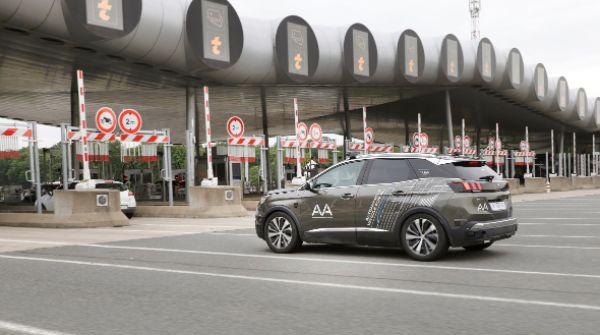On July 11, Vinci Autoroutes and Groupe PSA deepened trials to assess a vehicle’s ability to drive autonomously at cruising speed and pass through a tollgate in autonomous mode. Two new complex driving situations were also tested in real traffic conditions on the Vinci Autoroutes network. Changing into autonomous mode in a traffic area temporarily altered due to roadworks was one of them; and performing a ‘safe stop’, which involves the vehicle driving to a safe place in the event that the driver does not take back control in a specific situation (exceptional presence of obstacles on the road, severely deteriorated weather conditions, etc.) or in case of the end of the motorway.
These trials were carried out on the A10 and A11 motorways between Dourdan and Ablis in France using a Groupe PSA Peugeot 3008 prototype, which is part of the autonomous vehicle fleet for the AVA Autonomous Vehicle for All program.
Carla Gohin, Groupe PSA’s chief technology officer, said, “This trial is an additional step toward the deployment of autonomous vehicles. Two years after the first trial, the aim was to include even more constraints in the use cases by strengthening communication between the autonomous vehicle and the road infrastructure in order to broaden the scope of the system’s action while ensuring safety. These trials demonstrate the innovative and practical nature of the collaboration between Groupe PSA and Vinci Autoroutes, which is vital for the development of autonomous vehicles.”
Pierre Coppey, chairman of Vinci Autoroutes and executive vice president of Vinci, commented, “Smart motorway infrastructure is an essential asset in the development of autonomous vehicles. It enhances the contextual data shared with the navigation system to optimize the vehicle’s decision-making abilities and route. In this respect, our collaboration with PSA is full of promise. The motorway network offers a life-sized testing ground for new mobility solutions that will revolutionize road use in the future.”
Groupe PSA and Vinci Autoroutes have tested new autonomous vehicle features in Saint-Arnoult-en-Yvelines, following on from the trial carried out in July 2017, which led to the crossing of a tollgate in full autonomous mode for the first time.
The driving situations tested in this new phase of the program require more sophisticated communication between the autonomous vehicle and road infrastructure. The goal is to improve the vehicle’s ability to adapt its driving in exceptional or complex situations.
This operation is part of a collaboration between the two partners, which began in 2016. The results of these trials will feed into the standardization work that will be carried out in various collaborative projects such as C-Roads or the SAM Project, to which both groups contribute.


